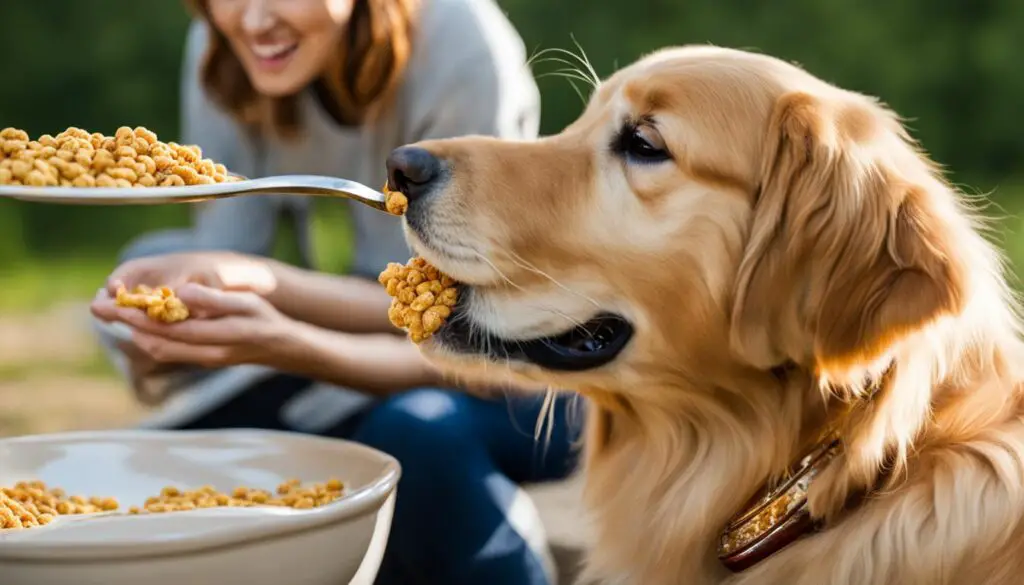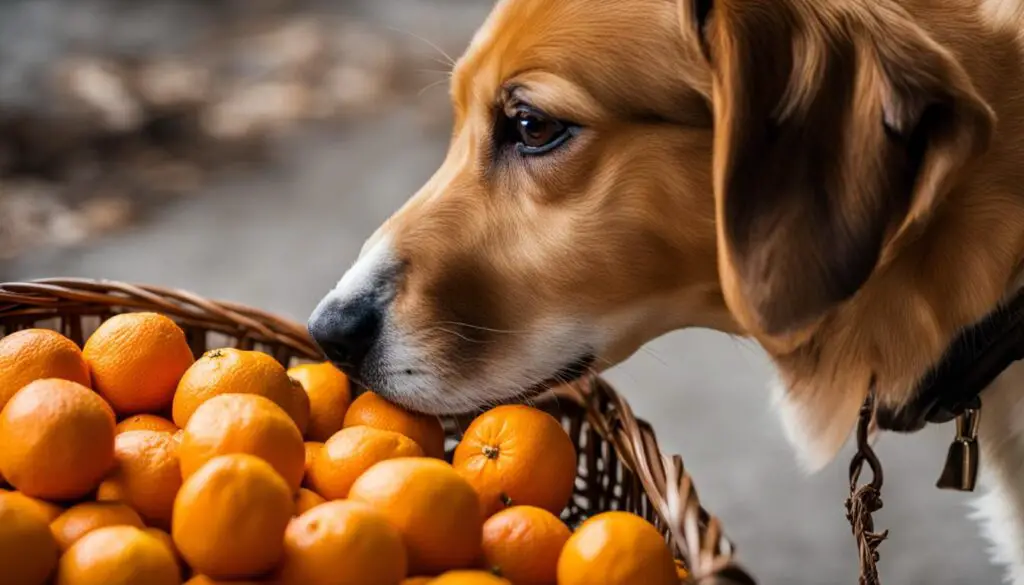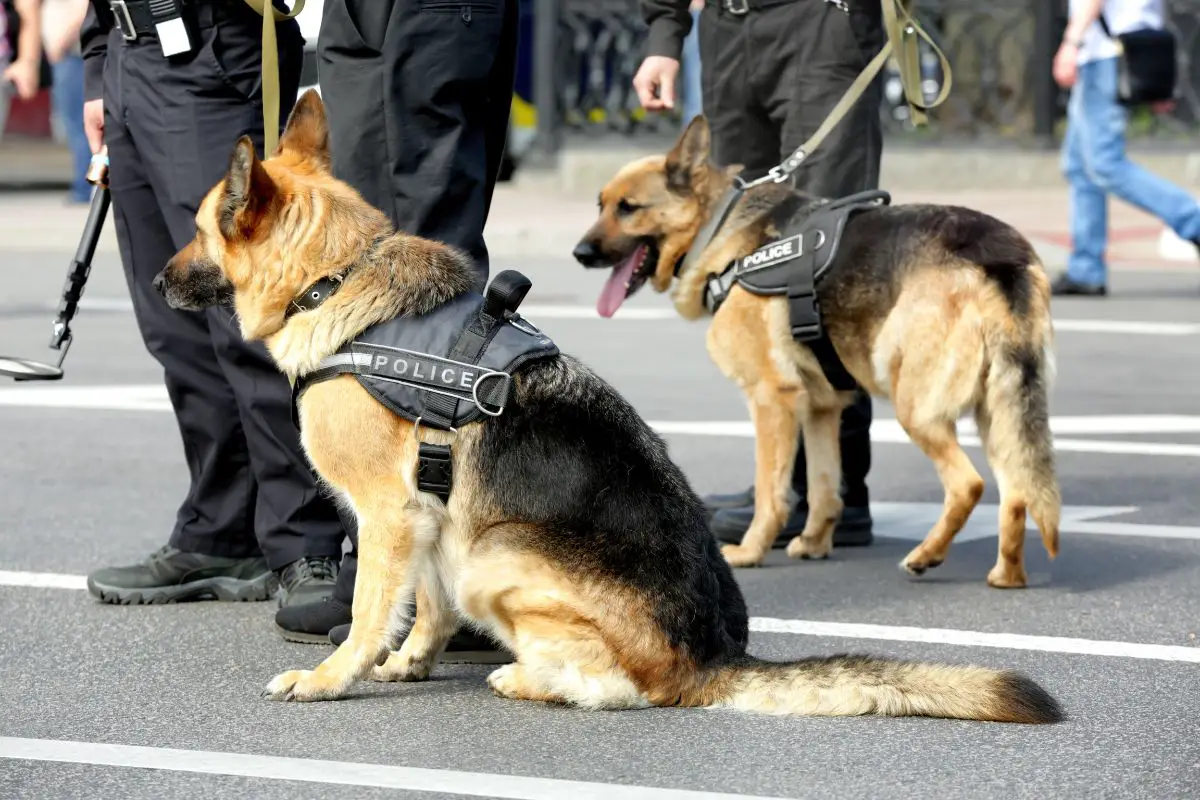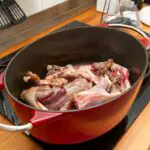Deer Antlers for Dogs: Are They Safe to Chew?
Dogs love to chew, and providing them with safe chew options is important for their dental health and overall well-being. One popular choice among dog owners is deer antlers. They are marketed as a durable and natural chew toy for dogs, and chosen instead of Rawhide. but are deer antlers really safe to give your dog.
NO, antlers are not safe for dogs to chew.
While some dogs may have no issues with antlers, there are potential hazards to be aware of.
Antlers can cause dental problems, such as broken teeth and gum bleeding.
They can also pose a choking hazard if they break or splinter and get stuck in a dog’s mouth or throat. Ingested pieces of antlers can cause dangerous intestinal blockages.
It’s recommended to supervise your dog while they chew on antlers and consider alternatives if you’re concerned about their safety.
The websites that say antlers are safe, all have a commercial interest in selling you antlers.
But if you look at Vet advice, they all say antlers are best avoided due to the risks.
Apart from the health risks, there are also possible large financial Veterinarian costs to consider, like dental work or an invasive operation.
What are deer antlers and are they safe for dogs to chew?
Deer antlers are hardened, bony growths that develop on the heads of deer. They are often used as chew toys for dogs due to their durability and the fact that they are usually safe for dogs to chew. However, it’s important for dog owners to supervise their pets while they chew antlers to ensure they don’t break teeth or splinter the antlers, which can pose a choking hazard.
What are the differences between deer and elk antlers as dog chews?
Deer and elk antlers are both popular chew toys for dogs. Elk antlers are generally larger and softer than deer antlers, making them suitable for aggressive chewers. However, both types of antlers can provide a safe chew for dogs, and it ultimately depends on the individual dog’s chewing habits and preferences.
Antlers are not the same as Deer Bone. You might want to read Can Dogs Eat Deer Bone?
Are antler chews safe for dogs’ teeth?
Antler chews are generally considered safe for dogs’ teeth as they provide a durable surface for chewing that can help to keep a dog’s teeth clean. However, if you’re concerned about your dog’s ability to chew on hard objects or if your dog has chipped teeth in the past, it’s best to consult with a vet before giving them antler chews.
Where can I find antler chews for dogs?
Antler chews for dogs can be found in pet stores, online retailers, and even sometimes in the woods where they are naturally shed by deer. It’s important to ensure that the antlers you provide to your dog are clean, free from splinters, and of an appropriate size for your pet.
Are there any concerns about giving my dog antler chews?
While antlers may seem like a safe and long-lasting option, it’s essential to understand the potential hazards they can pose to our canine companions. Antlers can cause dental problems such as broken teeth and gum bleeding. If antlers break or splinter, they can become lodged in a dog’s mouth, throat, or intestines, leading to dangerous blockages that may require emergency surgery.
While some dogs may have no issues with antlers, it’s crucial to supervise your dog while they chew on antlers and consider alternative safe chew options. In this article, I will explore the various types of antler chews available for dogs, the risks associated with antler chewing, and provide alternatives to ensure your dog’s chewing needs are met without compromising their safety.
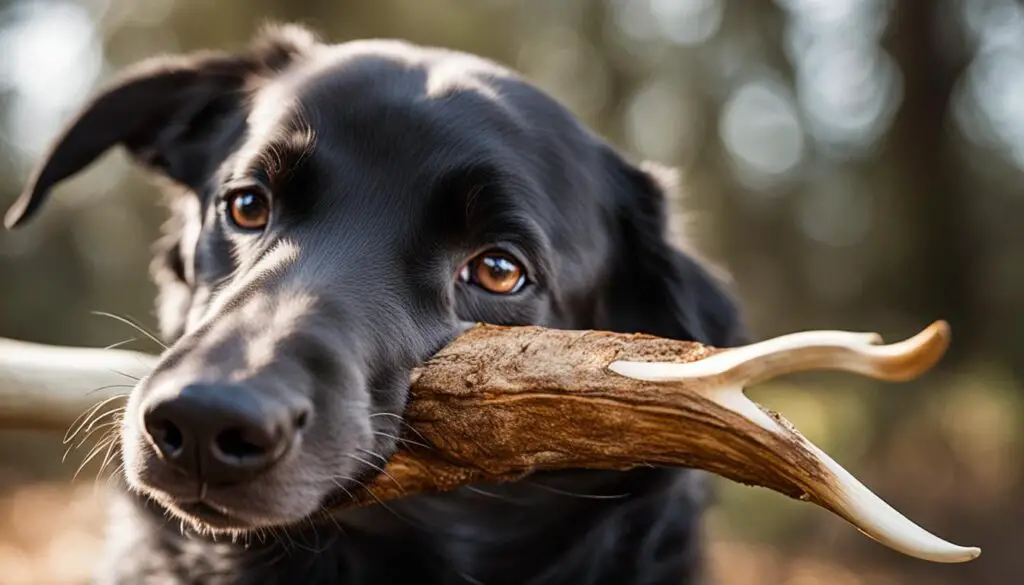
Key Takeaways:
- Deer antlers for dogs can pose dental risks such as broken teeth and gum bleeding.
- If antlers break or splinter, they can become a choking hazard or cause intestinal blockages.
- Supervision is essential when allowing dogs to chew on antlers.
- There are various types of antler chews available, including deer, elk, and moose antlers, as well as water buffalo horns.
- Alternatives to antlers, such as safe chew toys and veterinarian-approved chews, can provide a safer option for your dog.
Types of Antler Chews for Dogs
When it comes to providing a safe and satisfying chewing experience for your dog, there are various types of antler chews to choose from. Each type offers different textures, sizes, and chewing experiences, allowing you to select the perfect fit for your furry friend’s preferences and needs.
Deer Antlers
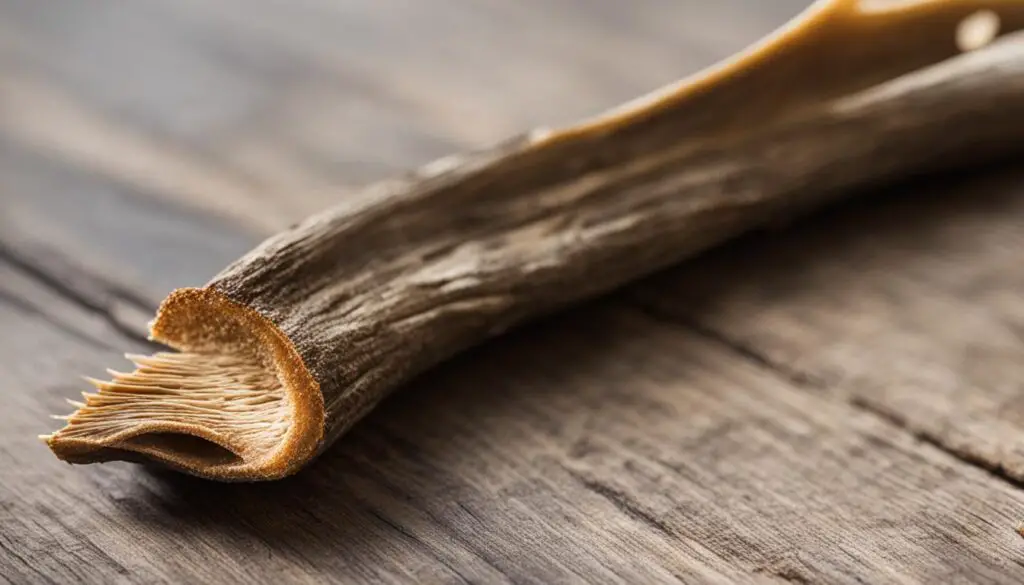
Deer antlers are a popular choice for dogs due to their hard texture and durability. Deer shed their antlers each year. They are available in a range of sizes, making it easy to find the right antler for your dog’s chewing behavior and size. Their hard texture ensures a longer-lasting chew, perfect for dogs who are aggressive chewers.
Elk Antlers
Elk antlers are usually larger in size compared to other antlers. They can be split, providing dogs with a unique chewing experience. The density of elk antlers may vary, offering different degrees of hardness. It’s important to consider your dog’s size and chewing strength when selecting an elk antler, ensuring it’s appropriate for their chewing habits.
Moose Antlers
Moose antlers have a softer texture compared to other antler types, making them a great option for dogs who prefer a less challenging chew. Moose antlers are often sold in slices and shapes, allowing you to find the perfect size and shape for your dog. They offer a variety of chewing experiences suited to different dogs’ preferences.
Water Buffalo Horn
In addition to antlers, there are also antler chews made from water buffalo horns. Water buffalo horns are known for their durability and provide dogs with a long-lasting chew. They come in different sizes and shapes to cater to various dogs’ chewing needs. These chews offer an alternative to antler chews while still offering a satisfying chewing experience.
Overall, the different types of antler chews available for dogs provide variety in texture and size, ensuring that there is a suitable option for every dog’s chewing behavior and preferences. Whether you choose deer antlers, elk antlers, moose antlers, or water buffalo horns, these natural chews offer a safe and enjoyable way to satisfy your dog’s need to chew.
The Risks of Antlers for Dogs
When it comes to chewing toys for dogs, antlers may seem like a natural and durable option. However, it’s important to be aware of the potential risks they pose to your furry friend’s dental health and overall well-being.
Dental Problems
One of the biggest risks of antlers for dogs is dental damage. The hardness of antlers can cause broken teeth, leading to pain, discomfort, and potential complications such as abscesses and infections. Additionally, chewing on hard surfaces like antlers can result in gum bleeding, further exacerbating oral health issues.
Choking Hazard
Another significant risk of antlers is the potential for choking. If an antler splinters or breaks into small pieces, it can become lodged in your dog’s throat, presenting a life-threatening situation. This choking hazard underscores the importance of closely supervising your dog while they chew on antlers.
Intestinal Blockages
Ingesting pieces of antlers can lead to intestinal blockages, which can be extremely dangerous for dogs. These blockages may require emergency surgery to remove the lodged fragments and alleviate the obstruction. It’s crucial to monitor your dog’s chewing habits and seek immediate veterinary attention if you suspect they have swallowed any pieces of antlers.
To mitigate these risks, it’s essential to prioritize antler chewing supervision. Keep a close eye on your dog while they interact with antlers and promptly remove any broken or fractured pieces. Additionally, consider exploring safer alternatives for your dog’s chewing needs to ensure their dental health and overall safety.
Alternatives to Antlers for Dogs
If you’re concerned about the safety of antlers for your dog, there are alternative chew toys available. It’s important to prioritize your dog’s safety while still providing them with suitable chew options. One way to minimize potential risks is to choose chew toys that have little flexibility and can’t fit completely into your dog’s mouth. This helps reduce the risk of choking and obstruction.
Consulting with your veterinarian is always a wise decision when selecting safe chew toys for your furry friend. Veterinarians can recommend suitable options based on your dog’s age, size, and chewing behavior. Another valuable resource is the Veterinary Oral Health Council, which provides a list of veterinarian-approved chews that meet specific safety and dental health standards.
When selecting a chew toy, it’s crucial to pick the right size for your dog. A toy that’s too small can be a choking hazard, while one that’s too large may cause discomfort or injury. Stay informed about any recalls by regularly checking for product updates from reputable manufacturers.
There are several alternatives to antlers that offer both entertainment and dental health benefits. Rubber toys, dental treats, and bones specifically designed for chewing are all great options to consider. These toys not only satisfy your dog’s natural urge to chew but also promote better dental hygiene. By opting for safe chew toys, you can provide your beloved pet with a fun and rewarding chewing experience while safeguarding their overall well-being.
FAQ
What are the different types of antler chews for dogs?
There are various types of antler chews available. Deer antlers for dogs have a harder texture and come in different sizes. Elk antlers are larger and can be split, with varying density. Moose antlers are softer and sold in different slices and shapes. There are also antler chews made from water buffalo horns. These offer options in texture and size to suit your dog’s chewing behavior and size.
- Are Antlers Safe For Dogs? - January 14, 2024
- Can Dogs Eat Honey Nut Cheerios? - December 23, 2023
- Natural Deworming Remedies for Your Dog - December 18, 2023


